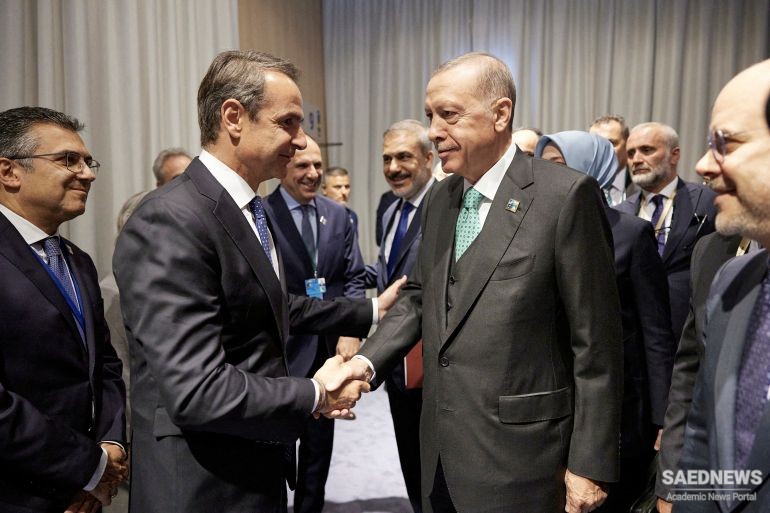SAEDNEWS: Turkish President Recep Tayyip Erdogan has arrived in Athens, the capital city of Greece, to attend the Greek-Turkish High-Level Cooperation Council. This marks his first visit in six years. His visit comes in light of both sides’ willingness to hit the reset button on bilateral ties while acknowledging the long-standing differences.
"We will go to Athens with a win-win approach. There, we will discuss both our bilateral relations and Türkiye-EU relations in order to make decisions worthy of the spirit of the new era," Erdogan told journalists ahead of his visit.
Highlighting the possibility for collaboration on mutually beneficial subjects and dialogue between two neighbours, the Turkish President embraces a diplomatic approach.
In a similar vein, former Greek Prime Minister and Foreign Minister George Papandreou remarked on how the dialogue between two sides can contribute to regional stability.
As the expected visit goes around the themes of regional stability and mutually beneficial collaboration, here is what encircles the new era of relations.
After a period of tense relations, the first positive steps from Greece came after the February earthquakes in Türkiye killed over 52,000 people. Greece sent aid and rescuers.
Subsequently, the election victory of Türkiye’s president and elections in Greece paved the way for bilateral relations to return to a positive trajectory.
In that refreshing political environment, Mitsotakis and Erdogan met on the sidelines of a NATO summit in July and separately in September in New York.
What are the existing differences and Turkish concerns?
Appearing in Turkish and Greek official statements, ‘positive climate’ emphasis in the new era seems to be accompanied by the emphasis on ‘the differences’ between both sides.
Regional challenges come with these differences in most cases, of which Cyprus, the Mediterranean, and the Aegean are at the heart.
"Whether it's the issues in the Aegean, joint efforts against irregular migration, the ongoing problems of the Turkish minority in Greece, there is no problem that we cannot solve through dialogue based on mutual goodwill," Erdogan also said.
Türkiye continuously articulates its sensitivities on maritime sea borders in the Mediterranean, however, also greenlights cooperation in energy drilling projects there with neighbouring countries.
Here are also the status of the Turkish Republic of Northern Cyprus and militarisation of Southern Cyprus issues. Türkiye defends the rights of Turkish Cypriots, and the sovereignty rights of TRNC as well as a two-state solution on the island.
Another pivotal area of concern of the Turkish state is the situation of the Turkish community in Western Thrace and the preservation of Turkish history there.
The last issue is Türkiye's ongoing fight with PKK terrorism and FETO, on which the Turkish state will expect respect and cooperation.
Collaborating through ‘dialogue’
Although there were some conflicts in the Mediterranean in the past, Turkish President Erdogan drew attention to the possibility of cooperation in the region in an interview he made with Greek newspaper Kathimerini on Wednesday.
Türkiye also expressed the potential of energy cooperation in the Mediterranean with a pipeline route passing through its territories and reaching Europe via Greece.
Turkish president, in the same interview, emphasised that both countries are NATO members and also neighbours whose relations need not turn into an enmity.
He says this respects both sides’ interests and rights, as well as underlining the importance of embracing peace and dialogue opportunities in the region.
What to expect from the meeting?
In the meeting, Türkiye-EU ties are expected to be on the agenda of discussion, including visa liberation and an update of the customs union agreement which Türkiye has long awaited.
As Western Thrace and Mediterranean have not witnessed any issue or escalation in near time, related to Greek action, how the agenda will integrate these topics is an issue of concern.
Also, Erdogan’s Gaza policy is expected to lead the discussions as both sides share a common interest in not seeing further escalation in Israel’s war on besieged Palestinian territory despite having different opinions on Hamas (SOURCE: TRT WORLD).


 Raisi says visits Russia to pursue immediate halt to Gaza bombardment
Raisi says visits Russia to pursue immediate halt to Gaza bombardment














































